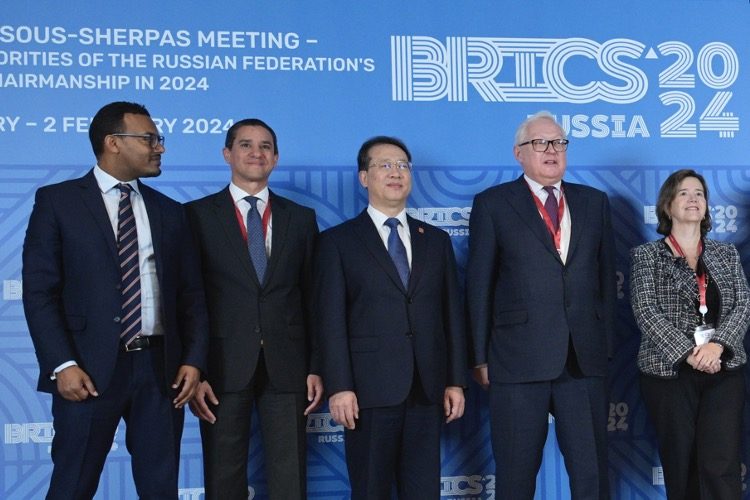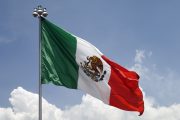
Russia is discussing using national systems for transmitting financial messages with other BRICS countries, the country’s central bank governor, Elvira Nabiullina, said on Tuesday, January 30.
“Russia has a System for Transmitting Financial Messages (SPFS), which is an alternative to SWIFT. Similar infrastructure exists in some other countries. We are holding discussions on the interaction of such platforms, but here the interest and technical readiness of our partners are important,” said Nabiullina.
She elaborated that 159 foreign participants from 20 countries have already joined the Russian system.
The SPFS was set up by the Bank of Russia to mitigate the risks of potential disconnection of Russian banks from SWIFT — an international interbank system for transmitting information and making payments, which links more than 11,000 organizations in almost every country in the world.
Besides, Russia will suggest key initiatives to boost cooperation among the BRICS countries in 2024 when it assumes the chairmanship of the bloc, Nabiullina continued.
“First of all, we would like to promote the topic of mutual recognition of ratings. This is very important for mutual trade and investment,” Nabiullina said.
Pointing out that the notion of creating supranational rating agencies has been broached both within BRICS and within the Eurasian Economic Union, she said the idea was promising but involved “a lot of complex issues,” including who should be the founder, how to facilitate financing, and how to guarantee the independence and professionalism of the agency.
“In our view, mutual recognition of ratings will be faster and more practical,” Nabiullina said.
Another initiative that Russia plans to put forward in BRICS is to combat the money-laundering of illicit funds. Russia has experience in creating an anti-money laundering platform called “Know Your Customer,” which it is willing to share.
“We want to see what common platform solutions in this area can be developed at the level of BRICS. This would greatly simplify the cooperation of business between our countries,” Nabiullina added.
Russia also hopes to establish a settlement-depository infrastructure and create a common platform for training and exchange of experience for the BRICS countries, she said, admitting that the final agenda will be determined by the end of February.
Also, Nabiullina, told RIA Novosti that the BRICS states have exceeded the G7 in terms of share in global GDP in PPP terms.
According to the central bank chief, with the addition of the new members, the group’s share in global output rose from 31 percent to 35 percent as of the end of 2023.
The metric that Nabiullina employed is called GDP in terms of PPP, or purchasing power parity. PPP is a metric popular with many economists and compares economic productivity and standards of living between countries for the differences in the cost of goods and services.
“BRICS economies are developing quite quickly,” Nabiullina said, highlighting that the group is playing a crucial role in the world.
Last year witnessed an historic enlargement of the BRICS group. Formerly made up of Brazil, Russia, India, China, and South Africa, the economic bloc admitted Saudi Arabia, Iran, Ethiopia, Egypt, Argentina, and the United Arab Emirates (UAE), while leaving the door open to accepting new members.
Although Argentina officially accepted the invitation and was set to join on January 1 of this year, newly elected President Javier Milei reversed the decision, pledging to pursue closer ties with the West instead.
With five more new nations, BRICS is poised to account for more than 40 percent of global crude oil production, while its population will amount to nearly 3.6 billion — almost half of the world’s total.
Numerous other states have voiced interest in becoming members of BRICS, while some have already formally submitted applications. The latter group includes Venezuela, Thailand, Senegal, Cuba, Kazakhstan, Belarus, Bahrain, and Pakistan.
As per data from the IMF, the G7’s share in global GDP in terms of PPP has been on a steady drop over the past several years, falling from 50.42 percent in 1982 to 30.39 percent in 2022. The Washington-based institution expects the figure to edge lower to 29.44 percent this year.
Russia assumed the role of the rotating chairmanship of BRICS for 2024 on January 1.
Regarding the Russia-Ukraine conflict, Sergey Ryabkov, a Russian deputy foreign minister, said on January 30 that BRICS member states understand that political processes in achieving settlement in Ukraine are impossible without Moscow’s involvement.
“I think that the global majority, colleagues from different regions of the world, and BRICS has now become a truly global platform, understand this logic well, for them it is obvious, among other things, that no political processes are possible without Russia,” Ryabkov told reporters after a meeting of Sherpas of BRICS nations in Moscow.
Lambasting talks in the Copenhagen format that took place in June 2023 as “absurd,” Ryabkov said many BRICS countries have expressed their stances on the Ukraine issue in “one way or another” and suggested proposals and initiatives.
“We remember Brazil’s activity, we know about Chinese approaches to this topic, there was an African initiative, it continues. That is, there has been a dialogue on this topic among the BRICS countries, and it continues,” he stated.
Furthermore, Ryabkov maintained that the longer the West demands an adherence to Ukrainian President Volodymyr Zelensky’s peace formula, the worse it will be for them and Kyiv.
He said a scenario where U.S. nuclear weapons are mobilized on British territory is “quite possible,” reinforcing Russia’s warning to NATO against “further escalation, which is becoming increasingly dangerous.”
BRICS, a grouping of developing nations initially concentrated on economic cooperation, has emerged to become a key player in global politics. The alliance’s resistance to Western hegemony and its pursuit of reforms aligns with the national interests of its members.
However, challenges for the bloc remain, including the lack of a formal charter for admitting new members and existing conflicts, such as those between China and India, which may impede the organization’s development.


